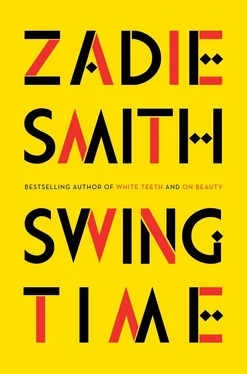The Africans of Ali Baba nailed their own shoes to the floor.
Six
At Aimee’s hotel we got into a series of SUVs. It was the full circus on that first trip: her children were with us, and their nanny, Estelle, and Judy of course, plus the three other PAs, a PR girl, Granger, a French architect I’d never seen before in my life, a star-struck woman from the Department for International Development, a journalist and photographer from Rolling Stone , and a man called Fernando Carrapichano, our project manager. I watched the sweating bellboys in their white linen uniforms heaving bags into trunks, helping everyone to their seats, and wondered what village they came from. I’d expected to ride with Aimee, in her car, to debrief her — for what it was worth — on my week’s reconnaissance, but when Aimee saw Lamin her eyes widened and the first thing she said to him after “Hello” was “You should ride with me.” I was directed to the second car, with Carrapichano. He and I were to pass the time together, so we were told, “ironing out the details.”
The drive back to the village was uncanny. All the difficulties I had come to expect from that journey were now absent, as when in a dream the dreamer is lucid and able to manipulate everything around her. No checkpoints, not any longer, and no pot-holed roads bringing us to a standstill, and instead of the enervating, stifling heat, a perfectly air-conditioned twenty-one-degree environment and an ice-cold bottle of water in my hand. Our convoy, which included a pair of jeeps filled with government officials and a police motorcade, moved swiftly along streets that seemed at times to have been artificially cleared, at others artificially populated — lined with flag-waving children, like a stage set — and we took an odd, elongated route, weaving through the electrified tourist strip and then on through a series of suburban enclaves I had not realized existed, where huge, unfinished houses, blighted with rebar, struggled to rise up from behind their fortress walls. Under the influence of this state of unreality, I kept seeing versions of my mother’s face everywhere, in young girls running down the street, in old women selling fish in the markets, and once in a young man hanging off the side of a minibus. When we got to the ferry it was empty but for us and our cars. I wondered what Lamin made of it all.
• • •
Carrapichano I didn’t know very well and the only time we’d spoken before I’d made a fool of myself. It was on the plane to Togo, six months earlier, back when Togo was still on the shortlist, before Aimee had offended that tiny nation by suggesting, in an interview, that its government did “nothing for their people.” “What’s it like?” I’d asked, leaning over him, looking out of the porthole window, and meaning, I must admit, “Africa.”
“I have not been,” he said coldly, without turning round.
“But you practically live here — I read your résumé.”
“No. Senegal, Liberia, Côte d’Ivoire, Sudan, Ethiopia, yes — Togo, never.”
“Oh, well, you know what I mean.”
He’d turned to me, red-faced, and asked: “If we were flying to Europe and you wanted to know what France was like, would it help if I described Germany?”
Now I tried to make amends, small talk, but he was busy with a huge sheaf of papers, on which I spotted graphs I couldn’t follow, sets of statistics from the IMF. I felt a little sorry for him, stuck with us and our ignorance, he was so far outside his natural milieu. I knew he was forty-six, had a Ph.D., was an economist by training, with a background in international development, and that like Miriam he’d worked at Oxfam for many years: she was the one who’d recommended him to us in the first place. He’d spent most of the nineties managing aid projects in East and West Africa, in remote villages without television, and one interesting consequence of this — for me, anyway — was that he really did not have a very clear idea who Aimee was, beyond having registered her name, vaguely, as a phenomenon of his youth. Now he was having to spend all of his time with her, and therefore with people like Mary-Beth, Aimee’s ditzy second assistant, whose job consisted entirely of sending e-mails, dictated by Aimee, to other people, and then reading out the replies. Or grim Laura, assistant number three, who reigned over Aimee’s muscle aches, toiletries and nutrition, and happened to believe that the moon landings were staged. He had to listen to Judy read the star signs out each morning and plan her day accordingly. Amid the insanity of Aimee’s world, I should have been the closest thing he had to an ally, but every conversation we attempted went awry somehow, the way he understood the world was so genuinely alien to me that it felt as if he occupied a parallel reality, which I didn’t doubt was the real one, but which I couldn’t “speak to,” to use a favorite phrase of his. Aimee, equally helpless before a graph, liked him because he was Brazilian and handsome, with rich, curly, black hair and lovely gold glasses that made him look like an actor playing an economist in a movie. But it was obvious from the start there would be trouble for them ahead. Aimee’s way of communicating her ideas relied on a shared understanding — of Aimee herself, of her “legend”—and “Fern,” as she called him, had no context for any of that. He was excellent at ironing out the details: architectural plans, government negotiations, land contracts — all the various practical considerations. But when it came to speaking directly with Aimee about the project itself — which for her was primarily a personal and emotional undertaking — he was out of his depth.
“But what does it mean when she is saying to me: ‘Let’s make it kind of an illuminated ethos’?”
He pushed his glasses up his handsome nose and examined his many notes, the result, I presumed, of having dutifully transcribed every little piece of nonsense that had fallen from Aimee’s mouth during their eight-hour flight together. He held the paper up as if it might resolve itself into sense if only he stared at it long enough.
“Maybe I misunderstand? In what way can a school be ‘illuminated’?”
“No, no, it’s a reference to an album of hers: Illuminated. From ’97? She thinks of it as her most “positive” album, so the lyrics are, well, they’re sort of like: Hey, girls, go get your dreams, blah blah, you’re strong, blah blah, never give up . That sort of thing? So she’s basically saying: I want this to be an empowering school for girls.”
He looked bewildered.
“But why not just say this?”
I patted him gently on his shoulder: “Fernando, don’t worry — it’s going to be fine.”
“I should listen to this album?”
“Honestly, I don’t think that would help.”
• • •
Up ahead, in the next car, I could see Aimee leaning out of the passenger seat with her arm over the door, happily engaged with every wave or whistle or scream of delight from the street, which were, I felt pretty certain, not responses to Aimee herself but to this shiny cavalcade of SUVs rolling through rural areas in which not one in two hundred owned a car. In the village, out of curiosity, I often commandeered the phones of the young teachers, put my earphones in and listened to the thirty or so songs they tended to play on rotation, some of which came free with their minutes, others — especially beloved — they had spent precious credit to download. Hip-hop, R&B, soca, reggae, ragga, grime, dub-step, hi-life — ringtone scraps of the whole glorious musical diaspora could be heard, but rarely any white artists, and never Aimee. Now I watched her smile and wink at the many soldiers, who, relieved of their usual activity, stood aimlessly at the sides of the road, guns by their side, watching us pass. And wherever there was music, wherever kids were dancing, Aimee would clap her hands to get their attention and imitate their moves as best she could while still sitting down. This element of roadside rolling chaos that so affected and disturbed me, like a zoetrope unfurled and filled with every form of human drama — women feeding children, carrying them, talking to them, kissing them, hitting them, men talking, fighting, eating, working, praying, animals living and dying, wandering down the street bleeding from their necks, boys running, walking, dancing, pissing, shitting, girls whispering, laughing, frowning, sitting, sleeping — all of this delighted Aimee, she leaned so far out of that window I thought she might fall right through her beloved matrix and into it. But then she was always happiest in ungovernable crowds. Until her insurance company stopped her doing it she often crowd-surfed, and it never frightened her, as it did me, to be suddenly swarmed by people in an airport or the lobby of a hotel. Meanwhile the only thing I could see through my tinted window did not appear to surprise or alarm her, and when I made some reference to it in the few minutes we were together, standing on the gangway, watching our cars roll on to the spookily empty ferry and her children run delightedly up the cast-iron steps, to the upper deck, she turned to me and snapped: “Jesus Christ, if you’re gonna be shocked by every fucking sign of poverty you see here, this is going to be a mighty long trip. You’re in Africa!”
Читать дальше












